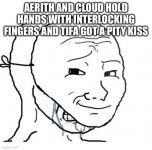That’s a lot of the issues for me in a nutshell.
I greatly admire, respect even, their commitment to ambition and creativity.
But they are playing around with very big ideas that have been unsatisfactorily explored in other works more often than not. It’s very hard to deliver and execute in a manner that both ably answers the questions presented, but keeps things grounded enough in the characters and emotions of the story that we as the audience are also able to receive an evocative response.
Sure it’s fun when we learn something new, and a mystery is neatly solved. The original after all had some fascinating mysteries that were slowly unravelled, but they all had incredibly rich conclusions and answers that were first and foremost grounded in the emotions of the characters.
This is what makes the Lifestream so important and significant. It’s the venue for where so many of the permeating questions and mysteries are finally resolved but more importantly it’s the emotional payoff for Cloud and Tifa’s entire history and development together as characters.
Ever since the original, I believe they have seriously struggled time and again in the Compilation to capably match this level of skilful execution when it comes to following through on the big ideas they are pushing.
Sadly Remake and Rebirth are following the trend that was established in works like Advent Children and Crisis Core, where they lose sight of what made a majority of us fall for this world and it’s story and characters.
They successfully course corrected to an extent with Remake’s far stronger characterisations, and a reaffirmation that they do understand and care about these characters and trying to do them justice.
But the ending of Rebirth shows they are still pulled in the other direction, where they are able to completely forget about where the focus should be.
In a major, crucial story moment such as the entire Forgotten Capital scene, and Aerith’s fate, everything in those moments should be focused in on the characters.
It’s more a character moment than it is a story one, at that particular moment. Her fate becomes more important to the wider narrative later.
But in the moment it happens, at least in the original, Cloud literally tells Sephiroth to shut up, and to stop his monologuing because in that moment all that matters is that Aerith is gone. The moments after care about showing how the others feel about that loss. It remains firmly rooted in the emotions of the party, because how they are feeling should be mirrored by how the audience is feeling.
And for some bizarre reason that I can foresee people like myself pondering over for years, in Rebirth they chose to take this moment and make it all about the wider implications as it pertains to the ongoing trilogy long mysteries and questions about all the other things they’ve chosen to include and/or expand on from the original (they say) whilst robbing the scene and the characters of their own key, emotional moments.
For a very long game that spends the majority of the time spent exploring the depths of its cast of characters, and the connections they forge amongst themselves, the ending should be a rich and emotional conclusion to so much of what had been established in the characters and their bonds. Otherwise what was the point of it all, if during this key moment you instead choose to prioritise confusion and sowing further tangled webs of intrigue and mystery, because making sure the audience has enough nuggets to go on for another four years of theorycrafting is more worthwhile than giving Aerith the conclusion to her story in this game she deserves. More worthwhile than a satisfying denouement to the middle part of a trilogy.
They chose to make a comparison to The Empire Strikes Back, a middle film in a trilogy that leaves its heroes at their lowest point.
But the irony is Empire’s ending is laser focused in on the characters.
A friend mentioned the endings to Goblet of Fire and Half-Blood Prince, two entries in a series that similarly ends with the characters at a very low point in their developments and journeys, the story having taken dark harrowing twists.
But in each instances of these endings, not to mention other examples in film, tv and games, they are still satisfying endings because we have a very clear and concise understanding of the stakes of the story. We can feel and understand the emotions of the characters involved. We are left feeling saddened, demoralised, maybe even without hope if we don’t know how it ends in the final part, but what we aren’t left with is bewilderment and confusion and endless questions and concerns about what the hell just happened, which was what they deliberately chose to make us feel with Rebirth’s ending.
It’s a baffling creative decision that I believe leaves them backed into a very tight corner in respect to how they are going to have to handle this now for Part 3.
The very fact that the script for Part 3 is still roughly being drafted indicates the potential that they didn’t actually plan this out ahead, and might even be waiting to gage the reactions from the audience before committing to anything for Part 3’s story.
If you ever prioritise puzzle box storytelling over a character driven one, then the answer and payoff to the mysteries you favoured by their very definition have to be satisfying and executed well, otherwise not only have you failed the characters you overlooked in favour of a mystery, you failed the story you tried to needlessly over complicate to stoke interest during a waiting period for the story to be concluded.
Ok that is the last thing I’m going to say on the ending now until I eventually get to it in my playthrough.




